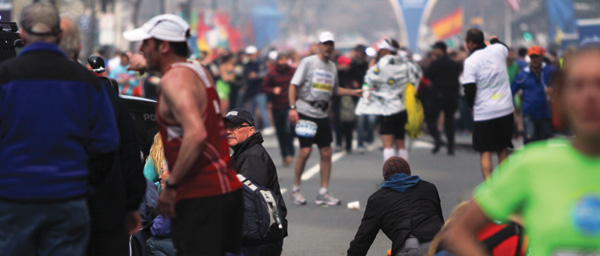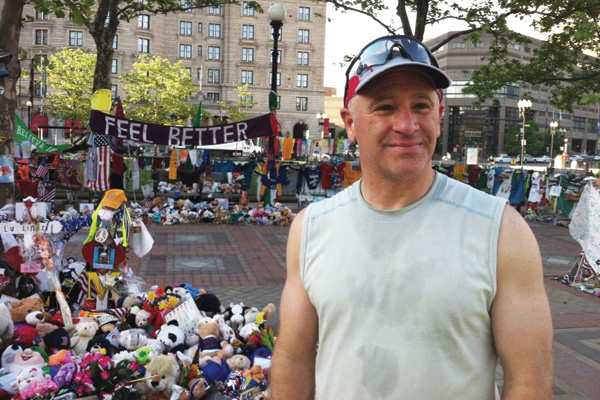Running into the Unknown

April 15, 2013 was the best day of my life. When I said so to my wife, Heather Ann Thompson ’92, she was stunned. Of course she was. How could I say such a thing, when on that gorgeous spring day, bombs detonated at the Boston Marathon finish line, killing three people, injuring 264 others, and traumatizing countless more?
“How could that be the best day of your life?” she asked.
It would be simple for anyone who wasn’t there, who didn’t experience what I experienced, to think me insensitive—that was certainly Heather’s initial reaction. Before you read on, please know that I care deeply about the pain and continued suffering of the people affected by that tragedy. But the events that day answered a question that I’d been asking myself my entire life.
All my life, I’d wondered what I would do, how I would respond when called, when challenged with a life-or-death situation. Would I run toward danger or away? Would I help others, as I thought, hoped, planned, or would I be concerned solely with my own personal safety?
This was one of my life’s existential questions, and the need to answer the question influenced many of my personal and professional choices. I sought answers in the U.S. Army and law enforcement. I engaged in challenging athletic endeavors such as skydiving, parachuting, and long-distance outdoor solo swimming. I continued playing rugby at an age when my contemporaries were sitting on the sidelines—their sons became my teammates.
But those were selfish choices. Those choices weren’t about others; they were about me.
On April 15, I faced a true life-or-death choice. I was forced, quickly and brutally, to decide what mattered more: my personal safety or aiding others in a life-or-death situation.
It was my moment. And in the ensuing 12 minutes, I learned what I was made of.

My younger brother—who ran the marathon—and I were celebrating his accomplishment at a post-race party at 667 Boylston Street. When the first bomb exploded, I knew, I absolutely knew, something was wrong. I smelled the sulfur; I saw the smoke; I heard the screams.
Within 30 seconds of the explosion I was on Boylston Street. I moved without hesitation, and with little regard for my own safety, running down three flights of stairs toward the explosion into an uncertain and dangerous situation. Into the unknown.
In those chaotic moments, I thought only that I was in a position to help the wounded and the frightened, who so desperately needed it, and I acted accordingly. In hindsight, I view what I did as defining who I am as a man.
There’s a lot of discussion in America today about masculinity—what men are supposed to do, how men are supposed to behave, our “role” in civilized society. The topic was often discussed and debated during my time at Vassar. The discussions are important. But that’s all they are. Discussions are not actions.
For most of the people involved in the Boston Marathon bombings, it was the worst day of their life. But for me, it was a crucible in which that question—my question—was answered.
To me, being a man is to act decisively in a life-or-death situation. To be courageous when others are cautious. To act when others hesitate. To be selfless when others think of themselves.
It was only afterward that I realized I had the answer.
That’s what I explained to Heather when she was so taken aback by what I said: I realize now that I never truly understood selflessness until I confronted the horror on Boylston Street.
